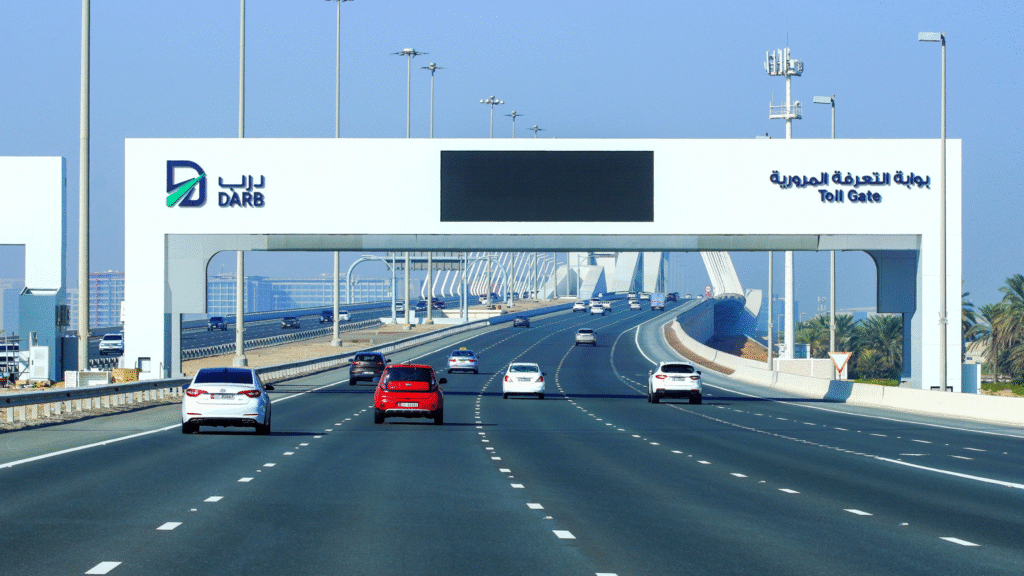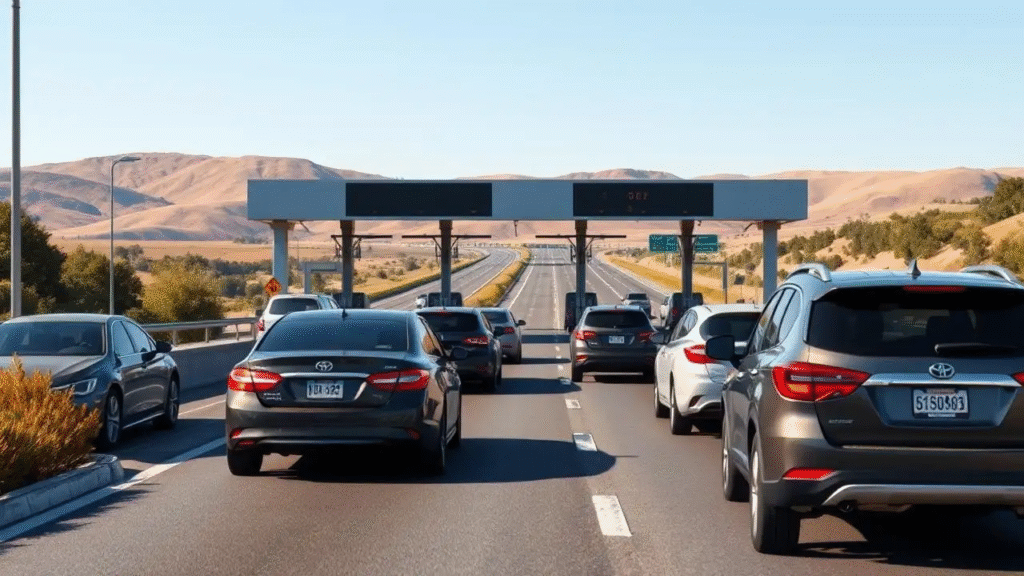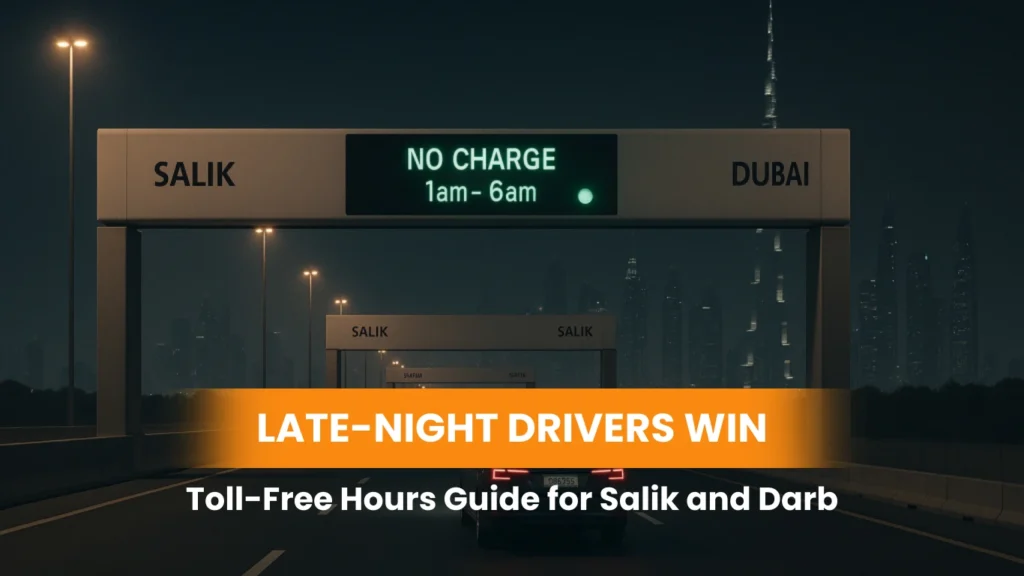Dubai and Abu Dhabi are cities where life runs 24/7. From late-night airport pickups to early-morning deliveries, the UAE’s roads are rarely empty. Yet behind every smooth drive is one recurring question for motorists: how much will I spend crossing Dubai toll gates or passing through Darb in Abu Dhabi?
For many residents, tolls are more than a fee—they’re a daily calculation of time, money, and convenience. But here’s the good news: both Salik toll gates in Dubai and Darb tolls in Abu Dhabi give drivers windows of relief. If you know the timings, you can cruise toll-free, saving money while still enjoying the freedom of driving.
So, when exactly do the charges pause—and how can you make the most of them? Let’s dive in.
Understanding Dubai’s Salik Toll Gates

Launched in 2007, Salik toll gates are Dubai’s smart road pricing system designed to ease traffic bottlenecks and encourage smoother journeys. Instead of physical barriers, RFID tags linked to your car plate deduct AED 4 each time you pass a gate. With locations on Sheikh Zayed Road, Al Maktoum Bridge, and other key points, they’re nearly unavoidable for regular commuters.
But not all hours are equal. Late-night drivers enjoy toll-free crossings that can add up to major annual savings.
Toll-Free Hours for Salik
According to RTA updates:
- Free hours: 10:00 PM – 6:00 AM daily
- Chargeable hours: 6:00 AM – 10:00 PM
That means anyone heading home late after a dinner in Downtown, or catching a 2:00 AM Emirates flight from DXB, avoids toll charges altogether.
Example:
A driver crossing 2 Salik gates twice daily during paid hours spends:
- 4 passes × AED 4 × 5 days = AED 80 per week
- Around AED 320 per month
By shifting some commutes to toll-free hours, even partial savings could reduce this by 30–40%.
Abu Dhabi’s Darb Toll System

Abu Dhabi introduced the Darb toll system in 2021, focusing on the four key bridges linking Abu Dhabi Island to the mainland: Sheikh Zayed, Sheikh Khalifa bin Zayed, Al Maqtaa, and Mussafah.
Unlike Salik toll gates, which charge throughout the day except late at night, Darb charges only during peak hours to target congestion.
Darb Timings
- Chargeable (AED 4 per crossing):
- Morning peak: 7:00–9:00 AM
- Evening peak: 5:00–7:00 PM
- Toll-free windows:
- Outside peak hours (before 7:00 AM, 9:00 AM–5:00 PM, after 7:00 PM)
- Entire Sundays
- All UAE public holidays
- Special Ramadan hours: 8:00–10:00 AM and 2:00–4:00 PM
In other words, for most of the day—and nearly all evenings—Darb crossings are free.
Why Toll-Free Hours Matter
In the UAE, where families balance fuel, maintenance, and parking costs, every saved dirham counts. Toll-free hours give drivers flexibility and reward smart planning.
- Families – Parents shuttling kids from school in Jumeirah to activities in Deira often face multiple Dubai toll gates daily. By scheduling evening trips after 10 PM, they avoid repeated charges.
- Night-shift workers – Nurses, hotel staff, or airport employees who commute late save hundreds annually since their work hours align perfectly with toll-free windows.
- Delivery & ride-hailing drivers – For fleet operators, every Salik or Darb crossing matters. Planning routes during free hours reduces operational expenses.
- Weekend adventurers – Heading for a Friday desert camp in Al Marmoom? Leaving after 7 PM in Abu Dhabi or 10 PM in Dubai means more budget for the barbecue, less for tolls.
Salik vs. Darb: The Key Differences
| Feature | Salik Toll Gates (Dubai) | Darb Toll System (Abu Dhabi) |
| Cost | AED 4 per pass | AED 4 per peak crossing (capped at AED 16 daily) |
| Timing | 6:00 AM – 10:00 PM chargeable | Only peak hours (7–9 AM, 5–7 PM) |
| Toll-Free Hours | 10:00 PM – 6:00 AM | Outside peaks + Sundays + holidays |
| Locations | Multiple gates across main roads | 4 key bridges to Abu Dhabi Island |
| Maximum Daily Cap | None | AED 16 |
This difference means Dubai drivers benefit most from late-night drives, while Abu Dhabi commuters enjoy all-day flexibility outside of rush hours.
Lifestyle Fit: Toll-Free Driving in the UAE

Imagine a Dubai couple living in Jumeirah Lake Towers. Their jobs in Business Bay mean daily crossings through Salik toll gates. By adjusting schedules—leaving early before 6 AM or staying late at the office until after 10 PM—they save hundreds annually.
Or consider a family in Khalifa City, Abu Dhabi. Their kids’ school run is unavoidable during Darb’s 7–9 AM peak, but grocery trips, weekend outings, and evening commutes remain toll-free almost all the time.
For delivery startups or ride-hailing drivers, timing routes after 7 PM in Abu Dhabi or after 10 PM in Dubai makes operations leaner and more profitable.
Practical Tips to Maximize Savings
- Track Toll Hours: Use RTA Dubai and Abu Dhabi Mobility apps for real-time toll info.
- Batch Trips: Instead of multiple short drives, combine errands during toll-free windows.
- Leverage Holidays: National holidays and Sundays are 100% toll-free in Abu Dhabi—plan long trips then.
- Alternate Routes: Some Dubai routes bypass Salik toll gates without adding much travel time.
- Carpool Smartly: Shared rides mean shared toll savings during chargeable hours.
Challenges Ahead
While toll-free timings benefit drivers, challenges remain:
- Traffic Shift: More drivers crowd into toll-free windows, potentially creating late-night congestion.
- Strict Cut-Offs: Missing 10:00 PM by minutes in Dubai means paying the full AED 4.
- Future Updates: Authorities may adjust timings as traffic patterns evolve, especially with EV adoption rising.
FAQs
Salik toll gates are free from 10:00 PM to 6:00 AM daily. During this window, you can cross any gate in Dubai without being charged AED 4.
Darb tolls apply only during peak hours: 7:00–9:00 AM and 5:00–7:00 PM on weekdays. Outside of these times, on Sundays, and on public holidays, crossings are free.
Each pass through a Salik gate costs AED 4, with no daily cap. For frequent commuters, costs can add up quickly unless trips are planned during toll-free hours.
Yes. In Abu Dhabi, Darb toll charges are capped at AED 16 per day per vehicle, even if you cross multiple times during peak hours.
Plan trips during toll-free hours, batch errands to reduce crossings, track official holidays (toll-free in Abu Dhabi), and use navigation apps like RTA Dubai or Abu Dhabi Mobility to check timings.
Driven to the Finish
Whether you’re a late-night airport traveler, a family planning weekend escapes, or a driver looking to cut costs, understanding toll-free schedules at Dubai toll gates and Darb is key.
Salik rewards those who drive after hours, while Darb makes commuting easier outside short peak slots. Together, they reflect the UAE’s commitment to balancing road efficiency with affordability.
So next time you cross Sheikh Zayed Road at midnight or cruise across Al Maqtaa Bridge after dinner, remember: the toll-free hours aren’t just about saving money—they’re about driving smarter.
Freedom after dark, savings in your wallet—welcome to toll-free driving in the Miss Auto UAE







